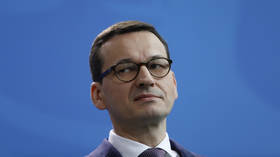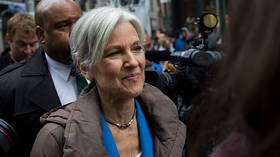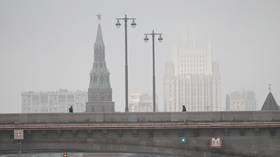EU faces 'serious fight' over Ukrainian grain

Multiple EU states have vowed to defy an order from Brussels to lift bans on the storage and sale of cheap Ukrainian grain in neighboring countries.
Polish Prime Minister Mateusz Morawiecki announced on Friday that Warsaw will unilaterally block the import of agricultural produce from Ukraine starting at midnight, after learning that the EU has decided to lift the ban imposed in May to protect farmers in several member states.
Hungary, Romania and Slovakia will also reinstate their own bans and brace for “a serious fight in Brussels,” Hungarian PM Viktor Orban said in a radio appearance on Friday.
Morawiecki’s announcement makes good on his threat from Tuesday that Poland “will not allow Ukrainian grain to flood us.” The Polish general election is next month and the ruling party has tried to paint the opposition as lackeys of the EU.
Speaking at a campaign event in Elk, Morawiecki said “What we will do now, we will extend this ban, despite the disagreement of the European Commission.” He accused the opposition Civic Platform of going to Brussels “on its knees, with paws like a dog to beg for some kind of consent and still gets punched in the face.”
The EU had imposed a temporary moratorium on import of Ukrainian wheat, corn, rapeseed, and sunflower seeds to Poland, Bulgaria, Hungary, Romania and Slovakia in early May, overriding the bans already put in place by those countries. Farmers in the five member states of the bloc had been protesting the disruption to the highly regulated market caused by Ukrainian exports, after Brussels lifted the tariffs on Kiev to help President Vladimir Zelensky’s war effort.
The ban allowed Ukrainian products to be transported through the five countries, but not sold or warehoused there. It was originally supposed to end in June, but was extended through mid-September.
Last week, Zelensky insisted on letting the ban expire, saying anything else would be a betrayal of “European values” and threatening to take the EU to the World Trade Organization (WTO) for arbitration.
Orban explained that the EU had originally justified the “grain corridors” by claiming the Ukrainian products will feed the hungry in Africa, but the imports ended up getting bought for cheap by European speculators instead.
“The poor African children haven’t seen a loaf of bread” from this grain, Orban said, calling the whole thing “a scam.” Ukrainian grain can still transit through Hungary, he added, but “it cannot stay here, it cannot stay in Europe.”













